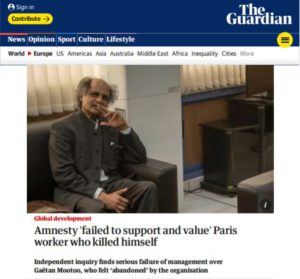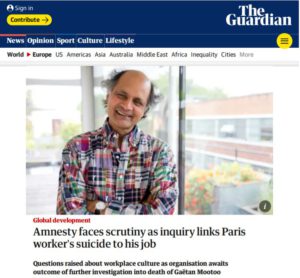Independent inquiry finds serious failure of management over Gaëtan Mootoo, who felt ‘abandoned’ by the organisation

Amnesty International failed to support a researcher who killed himself in his Paris office after feeling “abandoned and neglected” by the organisation, according to an investigation.
The independent inquiry commissioned by Amnesty into the death of Gaëtan Mootoo concluded that multiple failings to support the employee of three decades amounted to “a serious failure of management”.
Unite, which represents hundreds of Amnesty staff in offices around the world, revealed one in three employees recently surveyed by the union felt “badly treated or bullied at work since 2017”.
The internal survey was at the international secretariat, which has more than 600 employees, but Unite was unable to provide figures on how many staff were surveyed.
James Laddie, QC, found Mootoo, 65, had made a “long and valuable” contribution to Amnesty. Mootoo, a researcher for west Africa, was employed by the international secretariat. Laddie said of the researcher: “It is obvious that he touched people’s lives in a way that most can only aspire to.” But he found that Mootoo was “disregarded” as an “old-timer” who would soon retire.
“More efforts could and should have been made to enable him to serve out his final years with dignity,” he found. His last years were marked with “fatigue and disillusionment”, in part due to his impending retirement and decreasing productivity, the report said.
However, he was also made very unhappy by a “justified sense of having been abandoned and neglected”, it said.
“Whilst it is impossible to know the precise reasons behinds his decision to take his own life it is clearly the case that his unhappiness at work was a significant contributing factor.”
A key finding of the report included a failure by the secretariat, specifically the senior leadership team, to value Mootoo’s continued employment; and a failure of the secretariat to act on his health concerns in 2016 and 2018. Mootoo had made “strenuous efforts” to persuade his managers to recruit an assistant, but was left “feeling, with justification, that his requests were not given serious consideration”.
Mootoo took his life at Amnesty’s Paris office on 26 May. He left a note in which he complained of work pressure and a lack of management support.
A reorganisation of the workforce, which shifted jobs from London and Europe to 17 countries around the world, resulted in the researcher losing his team and being left to work alone.
Laddie’s report follows a French investigation which found Mootoo repeatedly asked for help, but that his requests “fell on deaf ears”.
In a statement, Amnesty’s new secretary general, Kumi Naidoo, described the report as “devastating” and said the criticism will hasten changes to the structure and workings of the senior leadership team within the organisation.
He said: “The report is a devastating account of how a long-standing and respected colleague struggled in the face of organisational change. The report’s findings trouble me profoundly and we must acknowledge our failures in the light of Gaëtan’s tragic death.
“…Staff wellbeing must be at the heart, front and centre of our leadership and management practice. Nobody in the organisation should feel isolated, undervalued, or ignored. I would like to assure you that the international board, the senior leadership team and I will work together to ensure that the recommendations are implemented. We will publish a detailed plan and timetable by the end of the year, including ways in which staff can feed into and help shape the work on wellbeing and duty of care.”
Naidoo said his predecessor had commissioned an assessment of policies and procedures to support the wellbeing of staff, which would be published in January.
- In the UK, Samaritans can be contacted on 116 123 or emailjo@samaritans.org. In the US, the National Suicide Prevention Lifeline is 1-800-273-8255. In Australia, the crisis support service Lifeline is 13 11 14. Other international suicide helplines can be found at www.befrienders.org.


